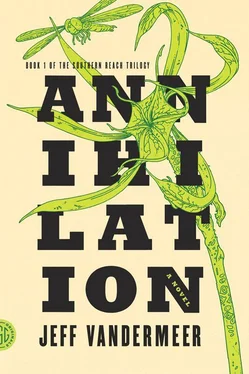A gasp from the surveyor cut me off in mid-question, no doubt much to the anthropologist’s relief.
“Look!” the surveyor said, training her flashlight down into the archway. We hurried over and stared past her, adding our own illumination.
A stairway did indeed lead down, this time at a gentle curve with much broader steps, but still made of the same materials. At about shoulder height, perhaps five feet high, clinging to the inner wall of the tower, I saw what I first took to be dimly sparkling green vines progressing down into the darkness. I had a sudden absurd memory of the floral wallpaper treatment that had lined the bathroom of my house when I had shared it with my husband. Then, as I stared, the “vines” resolved further, and I saw that they were words, in cursive, the letters raised about six inches off the wall.
“Hold the light,” I said, and pushed past them down the first few steps. Blood was rushing through my head again, a roaring confusion in my ears. It was an act of supreme control to walk those few paces. I couldn’t tell you what impulse drove me, except that I was the biologist and this looked oddly organic. If the linguist had been there, perhaps I would have deferred to her.
“Don’t touch it, whatever it is,” the anthropologist warned.
I nodded, but I was too enthralled with the discovery. If I’d had the impulse to touch the words on the wall, I would not have been able to stop myself.
As I came close, did it surprise me that I could understand the language the words were written in? Yes. Did it fill me with a kind of elation and dread intertwined? Yes. I tried to suppress the thousand new questions rising up inside of me. In as calm a voice as I could manage, aware of the importance of that moment, I read from the beginning, aloud: “ Where lies the strangling fruit that came from the hand of the sinner I shall bring forth the seeds of the dead to share with the worms that…”
Then the darkness took it.
“Words? Words?” the anthropologist said.
Yes, words.
“What are they made of?” the surveyor asked. Did they need to be made of anything?
The illumination cast on the continuing sentence quavered and shook. Where lies the strangling fruit became bathed in shadow and in light, as if a battle raged for its meaning.
“Give me a moment. I need to get closer.” Did I? Yes, I needed to get closer.
What are they made of ?
I hadn’t even thought of this, though I should have; I was still trying to parse the lingual meaning, had not transitioned to the idea of taking a physical sample. But what relief at the question! Because it helped me fight the compulsion to keep reading, to descend into the greater darkness and keep descending until I had read all there was to read. Already those initial phrases were infiltrating my mind in unexpected ways, finding fertile ground.
So I stepped closer, peered at Where lies the strangling fruit . I saw that the letters, connected by their cursive script, were made from what would have looked to the layperson like rich green fernlike moss but in fact was probably a type of fungi or other eukaryotic organism. The curling filaments were all packed very close together and rising out from the wall. A loamy smell came from the words along with an underlying hint of rotting honey. This miniature forest swayed , almost imperceptibly, like sea grass in a gentle ocean current.
Other things existed in this miniature ecosystem. Half-hidden by the green filaments, most of these creatures were translucent and shaped like tiny hands embedded by the base of the palm. Golden nodules capped the fingers on these “hands.” I leaned in closer, like a fool, like someone who had not had months of survival training or ever studied biology. Someone tricked into thinking that words should be read.
I was unlucky—or was I lucky? Triggered by a disturbance in the flow of air, a nodule in the W chose that moment to burst open and a tiny spray of golden spores spewed out. I pulled back, but I thought I had felt something enter my nose, experienced a pinprick of escalation in the smell of rotting honey.
Unnerved, I stepped back even farther, borrowing some of the surveyor’s best curses, but only in my head. My natural instinct was always for concealment. Already I was imagining the psychologist’s reaction to my contamination, if revealed to the group.
“Some sort of fungi,” I said finally, taking a deep breath so I could control my voice. “The letters are made from fruiting bodies.” Who knew if it were actually true? It was just the closest thing to an answer.
My voice must have seemed calmer than my actual thoughts because there was no hesitation in their response. No hint in their tone of having seen the spores erupt into my face. I had been so close. The spores had been so tiny, so insignificant. I shall bring forth the seeds of the dead.
“Words? Made of fungi?” the surveyor said, stupidly echoing me.
“There is no recorded human language that uses this method of writing,” the anthropologist said. “Is there any animal that communicates in this way?”
I had to laugh. “No, there is no animal that communicates in this way.” Or, if there were, I could not recall its name, and never did later, either.
“Are you joking? This is a joke, right?” the surveyor said. She looked poised to come down and prove me wrong, but didn’t move from her position.
“Fruiting bodies,” I replied, almost as if in a trance. “Forming words.”
A calm had settled over me. A competing sensation, as if I couldn’t breathe, or didn’t want to, was clearly psychological not physiological. I had noticed no physical changes, and on some level it didn’t matter. I knew it was unlikely we had an antidote to something so unknown waiting back at the camp.
More than anything, the information I was trying to process immobilized me. The words were composed of symbiotic fruiting bodies from a species unknown to me. Second, the dusting of spores on the words meant that the farther down into the tower we explored, the more the air would be full of potential contaminants. Was there any reason to relay this information to the others when it would only alarm them? No, I decided, perhaps selfishly. It was more important to make sure they were not directly exposed until we could come back with the proper equipment. Any other evaluation depended on environmental and biological factors about which I was increasingly convinced I had inadequate data.
I came back up the stairs to the landing. The surveyor and the anthropologist looked expectant, as if I could tell them more. The anthropologist in particular was on edge; her gaze couldn’t alight on any one thing but kept moving and moving. Perhaps I could have fabricated information that would have stopped that incessant search. But what could I tell them about the words on the wall except that they were either impossible or insane, or both? I would have preferred the words be written in an unknown language; this would have presented less of a mystery for us to solve, in a way.
“We should go back up,” I said. It was not that I recommended this as the best course of action but because I wanted to limit their exposure to the spores until I could see what long-term effects they might have on me. I also knew if I stayed there much longer I might experience a compulsion to go back down the stairs to continue reading the words, and they would have to physically restrain me, and I did not know what I would do then.
There was no argument from the other two. But as we climbed back up, I had a moment of vertigo despite being in such an enclosed space, a kind of panic for a moment, in which the walls suddenly had a fleshy aspect to them, as if we traveled inside of the gullet of a beast.
Читать дальше
Конец ознакомительного отрывка
Купить книгу












